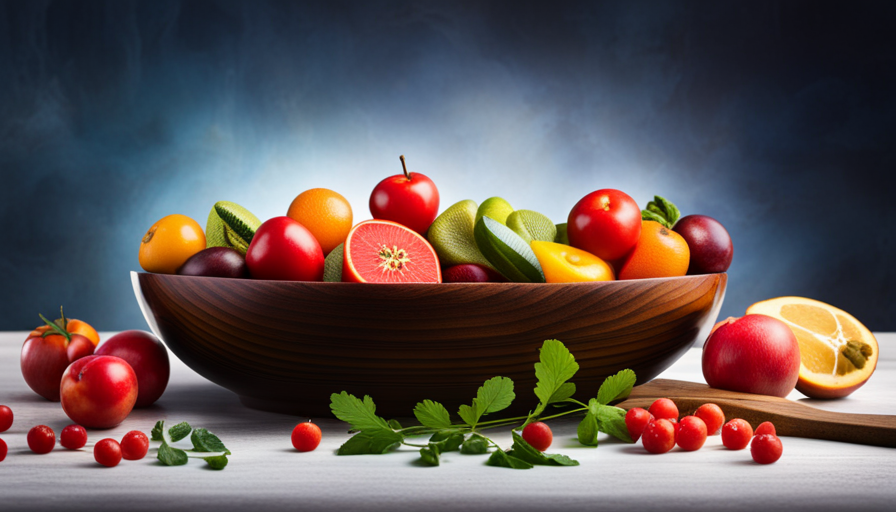Picture your body like a battleground, where cancer is the adversary. In this fight, you require every weapon possible to combat and take charge of your well-being.
One powerful weapon at your disposal is raw food. Just like a skilled archer needs the right arrows to hit the target, you need the right nutrients to target cancer cells and promote healing. Raw food, with its abundance of vitamins, minerals, enzymes, and antioxidants, can be your secret ally in this fight.
This article will serve as your guide on how to eat raw food for cancer. You’ll discover the link between diet and cancer, the benefits of a raw food diet, and how to incorporate raw fruits, vegetables, nuts, and seeds into your meals.
We’ll also explore how raw food can boost your immune system, reduce inflammation and oxidative stress, and provide support on your raw food journey.
By making informed choices and seeking guidance from a nutritionist or healthcare professional, you can harness the power of raw food to nourish your body and enhance its natural defenses against cancer. Let’s embark on this journey together and take control of your health, one raw bite at a time.
Key Takeaways
- Raw food is a powerful weapon against cancer, providing vitamins, minerals, enzymes, and antioxidants.
- Processed foods increase the risk of various types of cancer, while whole, plant-based foods reduce inflammation and promote healthy cell growth.
- Incorporating raw fruits, vegetables, nuts, and seeds into meals can provide essential nutrients and support immune function.
- While a raw food diet can be beneficial, it’s important to consult with a nutritionist or healthcare professional for personalized advice and to ensure all necessary nutrients are being obtained.
Understanding the Link Between Diet and Cancer
If you want to understand how what you eat can affect your risk of developing cancer, imagine your body as a garden that thrives or withers depending on the nutrients it receives.
It’s no secret that diet plays a crucial role in cancer prevention. Following dietary guidelines for cancer prevention can significantly reduce your risk of developing this devastating disease.
One of the key aspects of a cancer-preventive diet is avoiding processed foods. These foods, often high in unhealthy fats, sugars, and additives, have been linked to an increased risk of various types of cancer. Processed meats, for example, have been associated with an increased risk of colorectal cancer. Similarly, sugary drinks and snacks have been linked to a higher risk of developing cancers of the breast, pancreas, and colon.
Instead of processed foods, focus on consuming a diet rich in whole, plant-based foods. Fruits, vegetables, whole grains, and legumes provide essential vitamins, minerals, and antioxidants that support your body’s natural defenses against cancer. These nutrient-dense foods help to reduce inflammation, promote healthy cell growth, and support a strong immune system.
By understanding the impact of processed foods on cancer risk and following dietary guidelines for cancer prevention, you can take an active role in reducing your chances of developing this disease. Empower yourself with knowledge and make choices that promote a healthy, cancer-free life.
The Benefits of a Raw Food Diet for Cancer Patients
Indulging in a plant-based feast can be a powerful ally in the fight against the Big C. When it comes to cancer, a raw food diet can offer numerous benefits for patients.
Raw foods are rich in vitamins, minerals, and antioxidants that can boost the immune system and help the body fight off cancer cells. Additionally, raw foods are often low in calories and high in fiber, which can promote weight loss and reduce the risk of obesity-related cancers.
While a raw food diet has many benefits, it’s important to be aware of potential side effects and risks. Some individuals may experience digestive issues, such as bloating or gas, when first transitioning to a raw food diet. It’s also important to ensure that you’re getting all the necessary nutrients, such as protein and calcium, from your raw food sources. Consulting with a healthcare professional or a registered dietitian can help you create a well-balanced raw food meal plan that meets your nutritional needs.
A raw food diet can be a beneficial choice for cancer patients. By incorporating more raw fruits, vegetables, nuts, and seeds into your diet, you can provide your body with the necessary nutrients to support your immune system and fight against cancer cells. Just be sure to listen to your body, address any side effects, and work with a healthcare professional to ensure a well-rounded and nutritionally sound raw food meal plan.
Incorporating Raw Fruits and Vegetables into Your Meals
Incorporating raw fruits and vegetables into your meals can provide a wide array of vitamins, minerals, and antioxidants that support a healthy immune system and contribute to overall well-being.
When it comes to incorporating raw fruits and vegetables into your meals, there are several options to consider.
-
Raw food smoothies for a quick and nutritious meal: Smoothies are a great way to pack in a variety of raw fruits and vegetables in one go. You can blend together ingredients like spinach, kale, berries, and bananas for a delicious and nutrient-rich smoothie. Not only are these smoothies easy to make, but they also provide a convenient way to consume a large amount of raw fruits and vegetables in a short amount of time.
-
Raw food snacks for on-the-go nourishment: When you’re on the go, it’s important to have healthy and convenient snack options. Raw fruits and vegetables make perfect snacks as they’re portable and require minimal preparation. Consider packing sliced cucumbers, carrots, or bell peppers along with a dip like hummus for a satisfying and nutritious snack.
By incorporating raw fruits and vegetables into your meals, you can enjoy the benefits of a raw food diet while nourishing your body with essential nutrients. Whether it’s through raw food smoothies or on-the-go snacks, these options provide a convenient and delicious way to incorporate raw fruits and vegetables into your daily routine.
So start exploring different recipes and enjoy the goodness of raw food for your overall well-being.
Exploring Nutritional Powerhouses: Raw Nuts and Seeds
Discover the incredible nutritional power of raw nuts and seeds, packed with essential vitamins, minerals, and antioxidants to support your overall well-being.
Raw nuts, such as almonds, walnuts, and cashews, aren’t just delicious but also offer numerous health benefits. They’re rich in heart-healthy fats, protein, and fiber, which can help lower cholesterol levels, reduce the risk of heart disease, and support weight management. Additionally, raw nuts provide an excellent source of vitamins and minerals, including vitamin E, magnesium, and potassium, which are essential for maintaining optimal health.
Incorporating seeds into your diet is another great way to boost your nutritional intake. Chia seeds, flaxseeds, and pumpkin seeds are all excellent choices. These tiny powerhouses are loaded with omega-3 fatty acids, fiber, and antioxidants, which can help reduce inflammation, improve digestion, and support brain health. Furthermore, seeds are a great source of plant-based protein, making them an ideal addition to a raw food diet.
To enjoy the benefits of raw nuts and seeds, you can add them to your smoothies, sprinkle them on top of salads or yogurt, or simply snack on them throughout the day. Remember to choose raw and unsalted varieties to maximize their nutritional value. By incorporating these nutrient-dense foods into your meals, you can take a proactive step towards supporting your overall health and well-being.
Boosting Your Immune System with Raw Food
Boost your immune system and ward off illness by nourishing your body with the power of raw, nutrient-rich fruits and vegetables. Eating raw food can provide your body with essential vitamins, minerals, and antioxidants that are crucial for boosting immunity.
Here are three ways in which raw food can help you achieve a stronger immune system:
-
Increased intake of vitamins and minerals: Raw fruits and vegetables are packed with vitamins A, C, and E, as well as minerals like zinc and selenium. These nutrients play a vital role in supporting immune function and protecting your body against harmful pathogens.
-
Enhanced gut health: Raw food is high in fiber, which promotes a healthy gut microbiome. A strong gut microbiome is essential for a robust immune system as it helps prevent the growth of harmful bacteria and supports the production of immune-boosting compounds.
-
Try raw food recipes: Incorporating raw food into your diet doesn’t mean you have to eat plain salads all the time. There are plenty of delicious and nutritious raw food recipes available that can make your meals enjoyable and exciting. From refreshing fruit smoothies to zesty vegetable salads, the possibilities are endless.
Boosting your immune system with raw food is a natural and effective way to stay healthy. By incorporating nutrient-rich raw fruits and vegetables into your diet and exploring different raw food recipes, you can support your immune system and improve your overall well-being.
Raw Food Recipes for Cancer Prevention and Treatment
Try out these delicious and nutritious recipes to help prevent and treat cancer, using the power of raw, nutrient-rich ingredients. Raw food smoothie recipes are a great way to incorporate raw food into a busy lifestyle. Smoothies are quick and easy to make, and they allow you to pack a lot of nutrients into one glass.
One recipe to try is a green smoothie. Blend together a handful of spinach, a ripe banana, a cup of almond milk, and a tablespoon of chia seeds. This smoothie is packed with antioxidants and fiber, which can help boost your immune system and fight cancer cells.
Another recipe to consider is a berry smoothie. Blend together a cup of mixed berries (such as strawberries, blueberries, and raspberries), a tablespoon of flaxseed, a cup of coconut water, and a handful of kale. Berries are rich in antioxidants and vitamins, while kale provides essential minerals and fiber.
If you’re looking for a more filling option, try a raw food salad. Mix together a variety of chopped vegetables like carrots, cucumbers, bell peppers, and cherry tomatoes. Toss in some leafy greens, such as romaine lettuce or spinach. Top it off with a homemade dressing made from olive oil, lemon juice, and a pinch of sea salt.
Incorporating raw food into your diet doesn’t have to be complicated or time-consuming. These recipes are quick, easy, and delicious, making it easier to make healthy choices and support your overall health and well-being.
Overcoming Challenges and Finding Support on Your Raw Food Journey
As you embark on your raw food journey, you may find comfort and strength in the support of a community of like-minded individuals who understand the challenges and triumphs you may face along the way. Finding a community that shares your passion for raw food can provide you with valuable resources, inspiration, and a sense of belonging.
Whether it’s joining online forums, attending local raw food meetups, or participating in workshops and retreats, connecting with others who are on a similar path can make your raw food journey more enjoyable and fulfilling.
One of the challenges you may encounter on your raw food journey is the temptation to revert back to old eating habits. It can be difficult to resist the convenience and familiarity of processed and cooked foods, especially when cravings arise or when social situations revolve around non-raw food options. However, having a supportive community can help you stay motivated and accountable. Surrounding yourself with people who understand your goals and can offer advice, recipes, and encouragement can make it easier to overcome these challenges.
In addition to finding community support, it’s important to educate yourself about the potential pitfalls and obstacles of a raw food diet. Understanding common challenges such as nutrient deficiencies, food safety concerns, and social pressures can help you navigate these issues with confidence and make informed decisions about your health.
Remember, you’re not alone in your raw food journey, and with the support of a community, you can overcome challenges and thrive on this path to better health.
The Role of Raw Food in Reducing Inflammation and Oxidative Stress
Discover the power of incorporating nutrient-rich, unprocessed ingredients into your diet, as they’ve been shown to have a profound impact on reducing inflammation and oxidative stress, leading to improved overall health and well-being.
When it comes to fighting cancer, reducing inflammation is crucial, as chronic inflammation can contribute to the growth and spread of cancer cells. Raw foods, such as fruits, vegetables, nuts, and seeds, are packed with essential nutrients, enzymes, and antioxidants that can help reduce inflammation in the body.
Raw foods are known to be rich in antioxidants, which play a vital role in enhancing our body’s defense against oxidative stress. Oxidative stress occurs when there’s an imbalance between free radicals and antioxidants in the body, leading to cell damage and increased cancer risk. By consuming raw foods, you can provide your body with a wide range of antioxidants that can help neutralize free radicals and protect your cells from damage.
In addition to reducing inflammation and enhancing antioxidant defense, raw foods are also high in fiber, which can promote healthy digestion and regular bowel movements. This is important for cancer patients, as proper digestion helps eliminate toxins from the body and supports overall detoxification.
Incorporating raw foods into your diet can be a powerful tool in your fight against cancer. By reducing inflammation and enhancing antioxidant defense, raw foods can support your body’s natural healing process and contribute to improved health and well-being.
Research and Studies on the Effectiveness of Raw Food for Cancer
You’ll be amazed by the extensive research and studies demonstrating the effectiveness of incorporating nutrient-rich, unprocessed ingredients into your diet for fighting cancer. When it comes to raw food and cancer treatment, there’s growing evidence supporting its benefits.
Raw food can complement conventional treatments like chemotherapy and radiation, helping to enhance their effectiveness and reduce side effects. Several studies have shown that a diet rich in raw fruits, vegetables, and sprouts can improve the outcomes of cancer treatments.
Raw food contains a plethora of antioxidants, vitamins, minerals, and phytochemicals that can boost your immune system, reduce inflammation, and fight oxidative stress. These properties are crucial in combating cancer cells and supporting your overall well-being.
Moreover, raw food can help alleviate the negative effects of chemotherapy and radiation. These treatments often cause nausea, fatigue, and loss of appetite. Raw fruits and vegetables are easy to digest, provide vital nutrients, and can help manage these side effects. They also have a high water content, which aids in hydration, another essential aspect during cancer treatment.
It’s important to note that while raw food can be beneficial, it shouldn’t replace conventional cancer treatments. Instead, it should be seen as a supportive measure to optimize your health during this challenging time. Consulting with a healthcare professional or a registered dietitian can help you design a well-balanced diet that incorporates raw food while considering your specific needs and treatment plan.
Consultation with a Nutritionist or Healthcare Professional for Personalized Advice
When consulting with a nutritionist or healthcare professional, they can provide personalized advice tailored specifically to your needs and goals, helping you navigate through your journey towards optimal health. Can you imagine the relief of having a trusted expert guide you towards the most effective strategies for your well-being?
Seeking personalized guidance from a nutritionist or healthcare professional is essential when considering a raw food diet for cancer. These experts have in-depth knowledge of nutrition and its impact on cancer, and they can provide you with expert recommendations based on scientific evidence and research. They understand that every individual is unique and that what works for one person may not work for another.
During a consultation, the nutritionist or healthcare professional will take into consideration your specific health condition, medical history, and dietary preferences. They will work with you to create a personalized plan that includes the right balance of nutrients, vitamins, and minerals to support your body’s needs and promote healing.
In addition to providing guidance on the types of raw foods to include in your diet, they can also help you address any potential nutrient deficiencies and ensure that you’re meeting your calorie and protein requirements. They may also recommend specific supplements or complementary therapies that can further enhance your treatment and recovery.
By consulting with a nutritionist or healthcare professional, you can feel confident that you’re making informed decisions about your diet and lifestyle. Their expertise and personalized recommendations will empower you to take control of your health and maximize the effectiveness of a raw food approach to cancer treatment.
Frequently Asked Questions
Can a raw food diet cure cancer?
Yes, a raw food diet can provide numerous benefits for cancer patients. Consuming raw food recipes can help boost your immune system, increase your intake of antioxidants, and provide essential nutrients. While a raw food diet alone can’t cure cancer, it can support your overall health and well-being during treatment. It’s important to consult with a healthcare professional or registered dietitian to ensure you’re meeting your nutritional needs while following a raw food diet.
How can I ensure I am getting enough protein on a raw food diet?
To ensure you’re getting enough protein on a raw food diet, focus on incorporating plant-based protein sources such as nuts, seeds, legumes, and leafy greens. These foods provide essential amino acids and are rich in nutrients.
Additionally, sprouting or fermenting certain foods can increase their protein content. A raw food diet can offer numerous benefits, including increased energy, improved digestion, and enhanced nutrient absorption. However, it’s important to consult with a healthcare professional to ensure you’re meeting all your nutritional needs.
Are there any risks or potential side effects of following a raw food diet for cancer?
Potential risks and side effects of following a raw food diet for cancer have been extensively studied. Scientific evidence suggests that while a raw food diet can be beneficial in some ways, it may also have drawbacks.
One interesting statistic is that a long-term raw food diet can lead to nutrient deficiencies, particularly in protein, vitamin B12, iron, and calcium. Therefore, it’s important to carefully plan your meals and consider supplementation to ensure adequate nutrient intake.
Can a raw food diet be detrimental to my overall health if I have other medical conditions in addition to cancer?
A raw food diet may not be suitable for everyone, especially if you have other medical conditions in addition to cancer. There are potential risks associated with this diet, such as nutrient deficiencies and compromised immune function.
It is important to consult with a healthcare professional before starting any alternative diets, especially if you have underlying health issues. They can provide guidance and ensure you are receiving adequate nutrition while managing your medical conditions.
Are there any specific types of raw foods that should be avoided or limited for cancer patients?
To support your immune system and reap the benefits of raw food, it’s important for cancer patients to be mindful of certain types of raw foods. While raw fruits and vegetables are generally beneficial, it’s recommended to limit or avoid raw sprouts and raw eggs due to potential bacterial contamination.
Additionally, raw meat and seafood should be avoided to minimize the risk of foodborne illnesses.
By being cautious with your raw food choices, you can still enjoy the nourishing advantages it offers for cancer patients.
Can Eating Raw Food Help in Cancer Prevention or Treatment?
Eating raw food can be beneficial in cancer prevention and treatment. Many raw fruits and vegetables contain powerful antioxidants and anti-inflammatory compounds that can help protect against cancer. If you’re looking to improve your health, begin raw food journey by including more raw fruits and vegetables in your diet.
Conclusion
In conclusion, embracing a raw food diet can be a powerful tool in your fight against cancer. By incorporating raw fruits, vegetables, nuts, and seeds into your meals, you’re providing your body with a plethora of nutrients that can boost your immune system and reduce inflammation.
While there’s ongoing research on the effectiveness of raw food for cancer, consulting with a nutritionist or healthcare professional can provide personalized advice tailored to your specific needs. Remember, Rome wasn’t built in a day, so be patient and persistent on your raw food journey.










